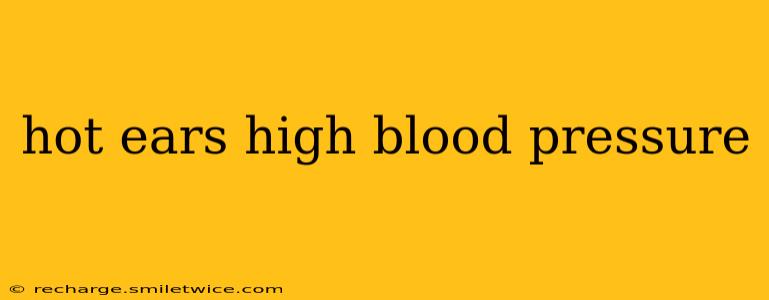Experiencing hot ears alongside high blood pressure can be concerning. While a fleeting sensation of hot ears isn't typically cause for alarm, persistent warmth or flushing in the ears coupled with hypertension warrants attention. This article delves into the potential relationship between hot ears and high blood pressure, exploring possible causes and offering guidance on when to seek medical advice.
What Causes Hot Ears?
Hot ears, or facial flushing, can stem from various factors, ranging from simple environmental triggers to underlying medical conditions. These include:
- Temperature changes: Exposure to heat, whether from the environment or exertion, can cause blood vessels to dilate, leading to a flushed feeling, including in the ears.
- Spicy food: Capsaicin, the compound that gives chili peppers their heat, can trigger vasodilation, resulting in a feeling of warmth in the face and ears.
- Alcohol consumption: Alcohol can cause vasodilation, leading to facial flushing and a sensation of hot ears.
- Stress and anxiety: The body's stress response can trigger the release of adrenaline, causing blood vessels to dilate and potentially leading to hot ears and a flushed face.
- Medications: Some medications, such as certain blood pressure medications or niacin, can cause flushing as a side effect.
- Medical conditions: Several medical conditions, including menopause, rosacea, and certain autoimmune diseases, are associated with facial flushing and hot ears.
Can High Blood Pressure Cause Hot Ears?
While high blood pressure itself doesn't directly cause hot ears in most cases, the underlying conditions contributing to hypertension or the medications used to treat it can. Elevated blood pressure often indicates an issue within the cardiovascular system. This might manifest in various ways, and increased blood flow to the face, including the ears, is a possibility in some instances. However, this isn't a common or defining symptom of hypertension.
Are Hot Ears a Symptom of a Hypertensive Crisis?
A hypertensive crisis refers to a dangerously high blood pressure reading, requiring immediate medical attention. While hot ears aren't a specific symptom listed for hypertensive crisis, other symptoms like severe headache, shortness of breath, and nosebleeds are far more significant indicators. A hypertensive crisis needs urgent medical intervention. If you are experiencing extremely high blood pressure readings accompanied by severe symptoms, seek immediate medical care.
Does High Blood Pressure Medication Cause Hot Ears?
Several medications used to treat high blood pressure can cause flushing or hot ears as a side effect. These often include calcium channel blockers, such as amlodipine, and some types of vasodilators. If you experience persistent hot ears after starting a new blood pressure medication, it’s crucial to discuss it with your doctor. They may adjust your medication or explore alternative treatment options.
When Should I See a Doctor About Hot Ears and High Blood Pressure?
It's important to consult your doctor if you experience:
- Persistent hot ears accompanied by other symptoms: Headaches, dizziness, shortness of breath, chest pain, or vision changes warrant immediate medical attention.
- Sudden onset of hot ears and high blood pressure: A sudden increase in both could indicate a more serious underlying health problem.
- Hot ears that are persistent and unexplained: If you consistently experience hot ears without any apparent trigger, it's essential to consult your physician to rule out underlying medical conditions.
- Hot ears alongside other symptoms indicative of a hypertensive crisis: As mentioned earlier, seek immediate medical attention if you experience symptoms like severe headache, shortness of breath, and nosebleeds alongside dangerously high blood pressure.
Conclusion
While a brief sensation of hot ears is usually harmless, the combination of persistent hot ears and high blood pressure requires medical evaluation. The underlying causes can range from benign factors to more significant health issues. Regular monitoring of your blood pressure and consultation with your doctor for persistent or concerning symptoms are crucial for maintaining overall health and well-being. Remember, this information is for educational purposes only and does not constitute medical advice. Always consult with a qualified healthcare professional for any concerns regarding your health.
